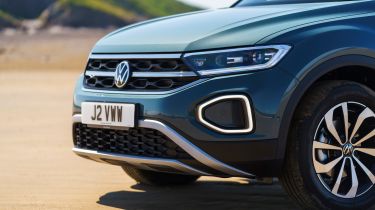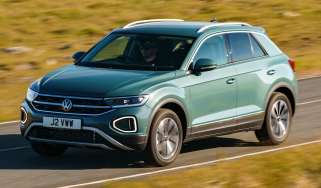Volkswagen T-Roc review - MPG, running costs & CO2
"The Volkswagen T-Roc is a frugal SUV, as long as you avoid the 2.0-litre petrol"
Volkswagen wants the T-Roc to have mass-market appeal, and as such you can choose from a broad range of petrol and diesel engines. The latter will mainly appeal to those who cover a high annual mileage, while the smallest petrols are just the job for those who make lots of short urban journeys - although they're capable of much more. Buyers in search of hybrid or electric power will be disappointed, however.
Volkswagen T-Roc MPG & CO2
The entry-level 1.0-litre TSI is the best choice for those looking for low running costs from a petrol engine. It returns up to 49.3mpg, which is a good figure for such a small engine in a relatively large car. CO2 emissions from 129g/km mean it’s the lowest-emitting petrol engine in the range, and the best choice for company-car drivers – although the option of a plug-in hybrid would be welcome as it would slash Benefit-in-Kind (BiK) tax.
Volkswagen’s 1.5-litre 'TSI EVO' petrol engine is larger and more powerful, but it shouldn’t be much more costly to run. Thanks to the engine’s ability to run on half its cylinders when full power isn't required, official fuel economy is still 47.3mpg, with emissions from 136g/km. Trim level specifications and the optional automatic gearbox can affect these figures though; the automatic offers up to 46.8mpg with CO2 emissions from 138g/km. These figures appeared realistic during our testing, where we achieved around 40mpg in town and up to 50mpg on the motorway.
More reviews
The top-spec 2.0-litre TSI petrol T-Roc only comes with 4Motion four-wheel drive and a seven-speed dual-clutch automatic gearbox, making it relatively uneconomical and therefore hard to recommend. As you’d expect, performance is the best of the three standard petrol models, but CO2 emissions are very high (166g/km) and fuel consumption is worse at 38.7mpg. That’s barely better than the 33.2mpg and 194g/km you can expect from the T-Roc R that has almost double the power.
Top-end models can end up costing more than £40,000 if you tick enough boxes on the options list, in which case you’ll have to pay an additional VED (tax) surcharge in years two to six of ownership, on top of the standard annual bill (after the CO2-weighted first year payment that’s rolled into the car’s price).
There are two diesel engines; a 113bhp 2.0-litre that replaces the old 1.6-litre TDI and can achieve up to 58.9mpg with CO2 emissions of 126g/km, and a 148bhp 2.0-litre unit that returns up to 56.5mpg while emitting from 131g/km. The optional all-wheel drive reduces the figure to 50.6mpg.
Insurance group
The Volkswagen T-Roc starts from insurance group 15 for the entry-level 113bhp 2.0-litre TDI diesel, with the higher-powered diesels sitting in groups 19 and 20. Strangely, while the entry-level 1.0-litre TSI petrol sits in group 18, the more powerful 1.5-litre with 148bhp starts from group 17. Unsurprisingly, the most expensive model to insure is the performance-focused T-Roc R in group 35.
Warranty
All Volkswagen T-Roc models come with a three-year/60,000-mile warranty, a three-year paintwork warranty and a 12-year body protection warranty for great peace of mind. Volkswagen (and most of its rivals) can’t match the seven-year, 100,000-mile warranty of the Kia XCeed, or the Toyota C-HR's warranty which can last for up to 10 years.
Servicing
Volkswagen offers a number of service plans to suit your car’s annual mileage. A four-year/75,000-mile plan costs around £250, while a five-year/90,000-mile plan costs around £550. The first oil and filter change is recommended at 10,000 miles or 12 months.
Which Is Best?
Cheapest
- Name1.0 TSI 115 Life 5dr
- Gearbox typeManual
- RRP£29,045
Most Economical
- Name1.0 TSI 115 Life 5dr
- Gearbox typeManual
- RRP£29,045
Fastest
- Name2.0 TSI 300 4MOTION R 5dr DSG
- Gearbox typeSemi-auto
- RRP£43,740













